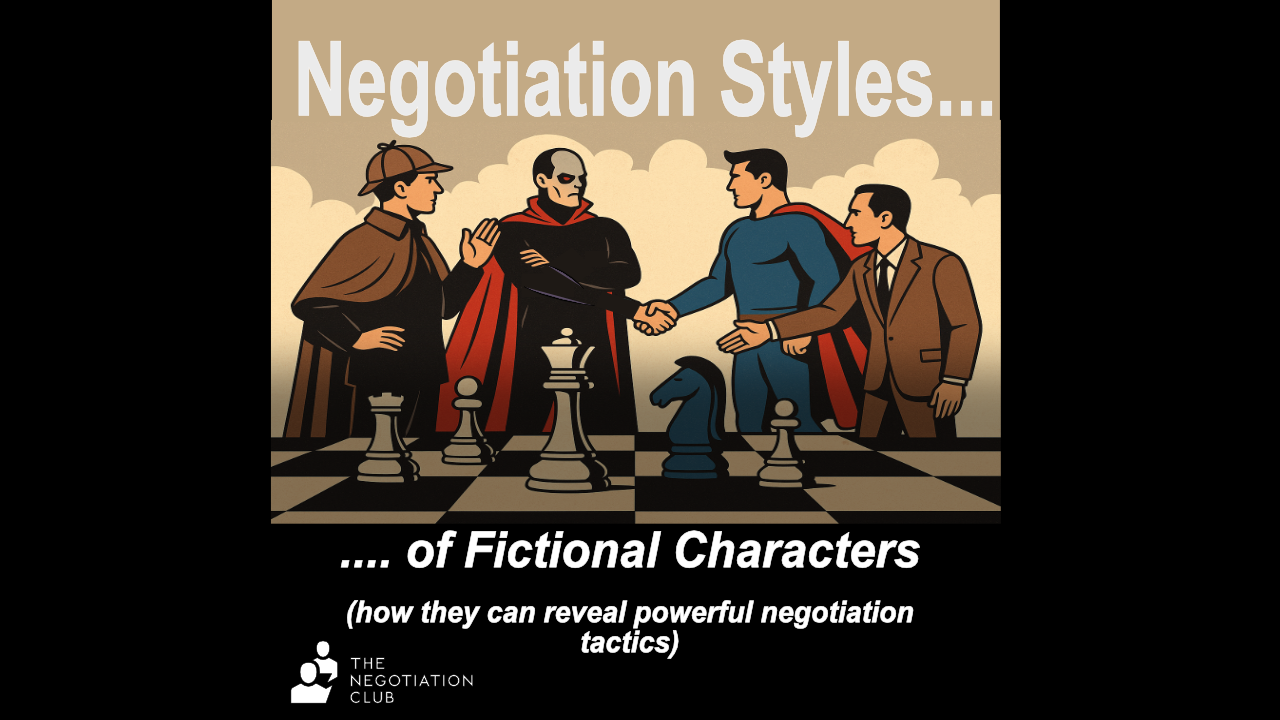
Why Studying the Negotiation Styles of Fictional Characters Is Both Fun and Useful
Negotiation is often described as an art form, a delicate balance between strategy, empathy and tactical communication. Yet, in the real world, it’s rare to witness masterful negotiations unfold firsthand.
The boardroom meetings, closed-door discussions and high-stakes exchanges that define professional negotiation are usually private, leaving us with limited exposure to observing the craft in action. This is where fiction, with its well-crafted narratives and characters, steps in to fill the gap, providing us with invaluable opportunities to watch, analyse and learn from the best—and sometimes the most unconventional—negotiators.
The Value of Fictional Characters in Understanding Negotiation
Fictional characters, whether they’re heroes, anti-heroes, or villains, are written with traits that exaggerate and highlight key human behaviours, including negotiation tactics. While these characters and their stories are scripted, the essence of their negotiation techniques often reflects real psychological principles and strategic approaches. Studying them allows us to break down complex negotiation styles into digestible lessons. It’s both fun and educational to imagine how we might channel Sherlock Holmes’ sharp analytical mind, or Hannibal Lecter’s psychological mastery, into our own dealings.
The Benefits of Learning from Fictional Negotiators:
- Accessible Observation of Techniques: Watching or reading about characters negotiating allows us to witness negotiation strategies that are rarely visible in everyday life. We can see how characters like Tony Stark use wit and confidence, or how Elizabeth Bennet from Pride and Prejudice stands firm with intelligence and poise. Each character’s unique style showcases tactics that can inspire our own.
- Emphasising Key Principles: Fictional characters often embody specific traits or negotiation principles to an extreme. This helps us see these principles in action and understand their impact more vividly. For example, James Bond’s composed confidence can teach the importance of maintaining calm under pressure, while Tyrion Lannister’s wit and strategic questioning reveal the power of intellectual agility in steering conversations.
- Building Empathy and Perspective: Exploring the negotiation styles of various characters helps us build empathy by stepping into their shoes and understanding how they approach conflicts. This can enhance our own ability to see a negotiation from multiple viewpoints and anticipate the reactions of others.
- Inspiring Creativity: Fictional negotiations often take place in heightened or dramatic scenarios, providing a broader canvas for creativity. They encourage us to think outside conventional boundaries and consider tactics that may not be immediately obvious. This can inspire us to be more adaptable and innovative in our own negotiations.
The Importance of Practice in a Safe Environment
While it’s insightful to study and analyse these characters’ negotiation tactics, real growth comes from practice. Just as watching a master chef doesn’t make one a culinary expert, observing fictional negotiations won’t automatically translate into real-world proficiency. Negotiation is a skill that needs to be practiced, refined, and adapted to fit our personal style and real-life situations.
However, practicing negotiation can be daunting, especially for beginners or those trying out new techniques. This is where having a supportive and safe environment, such as a negotiation club, becomes invaluable. Here’s why:
- Safe Space for Experimentation: A practice environment allows individuals to experiment with new negotiation techniques inspired by fictional characters without the risk of real-world consequences. Whether it’s trying out Lecter’s calculated silences or emulating the quick-witted questioning of a character like Sherlock Holmes, a club setting provides a safe space to explore these strategies and learn from mistakes.
- Feedback and Support: Practicing within a community like The Negotiation Club means you’re surrounded by peers and mentors who can provide constructive feedback. This feedback loop is essential for growth, as it helps you understand what worked, what didn’t, and how to adjust your approach.
- Building Confidence: The more you practice, the more confident you become in applying new techniques. Familiarity with a variety of negotiation styles allows you to pick and choose tactics that suit the situation at hand, making you a more versatile negotiator.
- Learning from Others: In a club, you’re not just practicing solo; you’re learning from the strategies and styles of others in the group. This collaborative learning reinforces your understanding of different approaches and expands your repertoire of negotiation tactics.
Bridging Fiction and Reality
The key to translating the negotiation lessons from fictional characters to real life is to remember that they are starting points for inspiration. Watching how a character navigates a complex discussion or uses charisma, intimidation, or logic can provide the spark that ignites your own strategic thinking.
Yet, as with any skill, it’s crucial to test and adapt these techniques in a practical setting.
The Negotiation Club, or similar practice-based environments, serves as the bridge between fictional inspiration and real-world application.
Final Thoughts
Studying fictional negotiators is not just an exercise in entertainment; it’s a practical, engaging way to enrich your understanding of negotiation as a skill. By observing how these characters employ different tactics, we can expand our own toolkits.
With practice in a safe and supportive environment, these lessons evolve from theory to practice, helping us become more effective, confident, and adaptable negotiators.
.... After all, while fiction gives us a taste of negotiation mastery, practice allows us to write our own stories of success.
About the Author Philip Brown

Phil Brown is the founder of The Negotiation Club, a training organisation built on the belief that negotiation is a skill developed through practice, not theory. With 30 years of procurement and commercial experience, Phil now helps professionals worldwide build confidence and fluency through structured, repeatable negotiation practice. Experience Phils unique negotiation practice at a FREE NEGOTIATION TASTER ....



